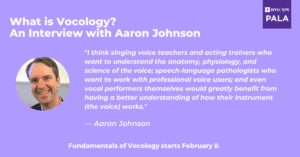Are you interested in voice production and training? The Certificate in Vocology might be calling your name. Vocology is highly multidisciplinary and spans multiple professions that study, train and care for vocalists. Our Certificate in Vocology provides foundational knowledge for anyone engaged in voice habilitation, including singing voice pedagogues, speech-language pathologists, voice and speech trainers, choral directors, and laryngologists.
We talked to NYU SPS instructor Aaron Johnson, about what students can expect from this certificate. Johnson is a researcher and speech–language pathologist who specializes in voice habilitation and rehabilitation. He will be teaching Fundamentals of Vocology this fall, starting October 11.
Read on below to dive deeper into vocology and get to know Aaron Johnson.
What is vocology?
AJ: The broadest definition of ‘vocology’ is ‘the study of the voice’. The word vocology has only been around a few decades and was formally introduced by Dr. Ingo Titze to refer to the science and practice of voice habilitation (training). This broad field encompasses many different professionals who train, care for, and study the voice, such as singing and acting voice teachers, speech-language pathologists, laryngologists, voice researchers, choral directors, and others. An important aspect of vocology is that it requires a multidisciplinary approach. Recently, the Pan American Vocology Association (PAVA) published standards by which an individual can become a PAVA-Recognized Vocologist. To earn this distinction requires both knowledge and experience across many different domains of vocology.
What can students expect from the certificate in vocology?
AJ: The certificate in vocology program consists of five courses providing a broad overview of vocology including the fundamentals of voice production, theory and application of voice habilitation methods, understanding voice disorders and their care, and how to study, measure, and research the voice. One goal of the program is for students to be prepared for the PAVA-Recognized Vocologist test by giving them not just knowledge, but also skills and resources for continued learning. I don’t view this course as teaching students everything about the voice. Instead, I hope to give students a strong foundation to enable lifelong learning and a thirst for continued exploration about the voice.
What do you expect to find most rewarding about teaching in this certificate program?
AJ: I am excited about developing and teaching in this program because it is exactly the kind of opportunity I would have liked early on my career. Like many people today who call themselves a ‘vocologist’, my professional path was very winding. I began as a singer, then singing voice teacher, then found my way to speech-language pathology and eventually voice research. A transformative experience in my own training was studying with Dr. Ingo Titze at the 8-week long intensive Summer Vocology Institute at the National Center for Voice and Speech. I am excited this new certificate program at NYU makes vocology knowledge and training accessible to students across the globe through a hybrid format of synchronous and asynchronous online content and meetings.
Who would benefit from the vocology certificate program?
AJ: Anyone who is interested in learning more about the voice would benefit from this program. In particular, I think singing voice teachers and acting trainers who want to understand the anatomy, physiology, and science of the voice; speech-language pathologists who want to work with professional voice users; and even vocal performers themselves would greatly benefit from having a better understanding of how their instrument (the voice) works. A lot of performers don’t have a solid foundation in the mechanics of voice production because so much of their training is focused on the aesthetics of performance – plus it’s hard to see what is going on inside the body that is producing that beautiful sound!
Register for Aaron Johnson’s Fundamentals of Vocology course here, starting October 11.
